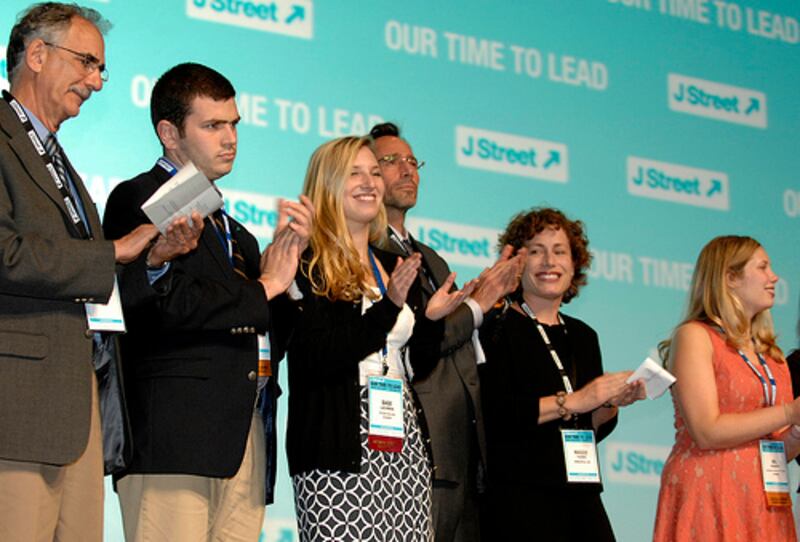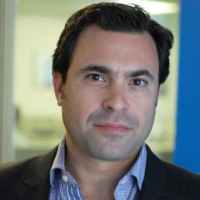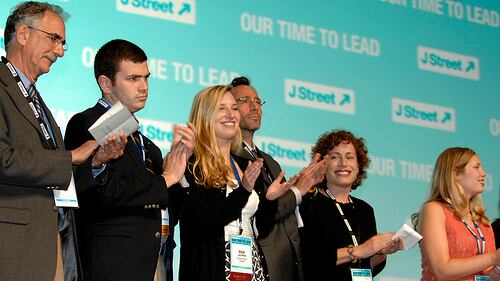“We are on the map and we are going to stay on the map”—this iconic Israeli phrase that basketball player Tal Brody tokened (yes, with a strong American accent) after the historic victory of Maccabi Tel Aviv over Z.S.K.A Moscow in 1977 can very much describe J Street and the American Jewish progressive voice after the organization’s fourth conference in Washington, D.C. earlier this week.
The conference was an important milestone for me personally, as it marked exactly four years since I had spoken as the U.S. representative of the Israeli human rights organization B’Tselem at the first J Street conference. Now that I’m back in Israel after four years, I can say without a doubt that the discourse on the Israeli-Palestinian conflict is not only changing, but is doing so quite rapidly.

In October 2009, during the first J Street conference, you could feel the hope in the air. Less than a year after the election of Barack Obama many thought J Street would become the new Obama administration’s AIPAC—a change we can believe in.
ADVERTISEMENT
But soon after, several combined elements threatened to ruin the party for the organization following its conception. The old Jewish establishment (which was fearing for its own standing in the community) staged a brutal attack, delegitimizing J Street as an anti-Israeli, pro-Palestinian organization. In many communities J Street representatives were banned from speaking, poisonous op-eds filled the Jewish press, and a handful of key supporters even left the organization. The more moderate forces within the American Jewish establishment offered a more nuanced approach, expressing the idea that “our tent is big enough to have J Street in it.”
Finally, the White House itself showed everyone that for the president, AIPAC’s is the only relevant Jewish voice to heed when it comes to Israel-related policy. That remained the case even when Netanyahu’s allies in Congress led the president’s defeat in the duel he had with the Israeli prime minister in May 2011.
Yet, the wheels were already spinning. Indeed, Jeremy Ben Ami and the people who founded J Street did a remarkable thing creating an umbrella that will bring together all the forces that work for peace and an end to the occupation, with a strategic plan to organize and influence policy. Yet, J Street was both a trigger for and the upshot of the changing perceptions already in motion within the American Jewish community. At the same time Peter Beinart published his piece about the failure of the American Jewish establishment, claiming that the demand it makes of young American Jews—to toss their progressive values in favor of supporting Israel absolutely—is unsustainable. The piece created shockwaves throughout the community. The failed attempts to stop the nomination of Rabbi Rick Jacobs for the position of president of the Union for Reform Judaism, one of the most powerful positions within the community, due to his tenure on the J Street Rabbinical Council, is further evidence that the voice J Street represents is not only under the American Jewish progressive tent; it is one of its foundations.
I could feel this change personally speaking in dozens of venues across the U.S. I could see the gap between the generations and how university students will not accept an “Israel no matter what” dogma, like their parents and grandparents whom I met while speaking at synagogues. The students wanted Israel to live up to the values it was based on and they understood something that many U.S. policy makers and public opinion shapers did not understand—that Israel is not a monolith, that it comprises other prominent forces that share the younger generation’s values, and that Bibi is no king. In that sense, J Street was smart to create its national campus operation J Street U. That made the organization almost immune to establishment attacks in the long run, as it supported the only organized platform representing the genuine point of view of young American Jews on this issue.
The speeches of Vice President Joe Biden, House Minority Leader Nancy Pelosi, Knesset members from six different Israeli parties—including from the Netanyahu coalition and the opposition—and departing Israeli Ambassador Michael Oren (who strongly refused to participate in the previous year’s conference) showcased the American Democratic and Israeli establishments’ recognition that J Street represents one of the most important voices in the American Jewish community.
Just like J Street, the Israeli progressive camp is at a turning point. The last elections in Israel showed the start of a revival of the Israeli Left, a process that has only strengthened since. With its renewed power, J Street has a better opportunity than ever to play a role in this process. J Street should act more forcefully to empower its true allies within Israeli society and showcase its alliances. It is no coincidence that Zehava Galon, the leader of the Meretz party, got the most standing ovations in the conference, in a non-apologetic speech for peace and against the occupation that captured the heart of the audience, more than any other Israeli—or American—speaker. J Street will only be able to flourish in the U.S. with the backing of a strong and successful Israeli progressive camp.






